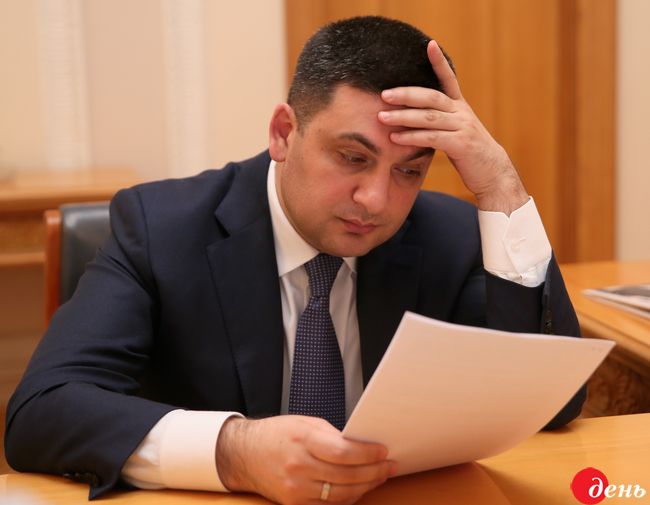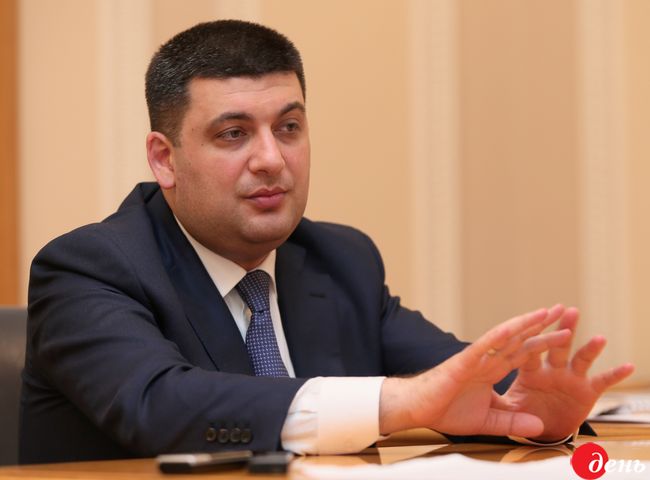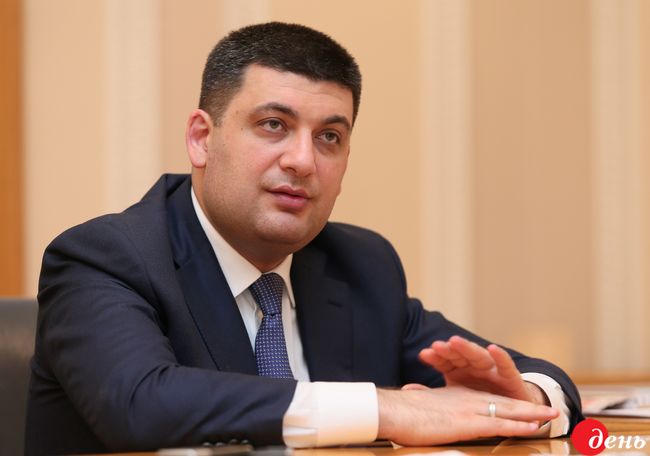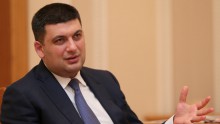We met Verkhovna Rada Speaker Volodymyr Hroisman after a second meeting of the Constitutional Commission which he chairs on the president’s initiative. We began the interview with what concerns the commission’s composition and objectives.
Hroisman tried to be expressly optimistic, although he looked extremely tired.
The interview lasted 50 minutes sharp. As we spoke, the office and cell phones rang twice and once, respectively, but the speaker did not cut the talk short.
“ON MAY 13 WE WILL PRESENT A BASIC DECENTRALIZATION PACKAGE”
The Constitutional Commission, set up by a presidential decree in early March, held its second meeting last Wednesday. What did you discuss? What concrete problems is the commission to solve to amend the Constitution?
“We held a second meeting just a week after the first one. We have in fact already solved all the organizational matters. The Constitutional Commission has formed three groups to deal with: 1) human rights; 2) the judicial and law-enforcement systems; 3) decentralization and local self-government – the overall system of public administration.
“We have quite an ambitious plan. We must make all the decentralization-related changes by mid-July.
“Under the law, the changes are to be passed by 226 votes at a parliamentary session and then submitted to the Constitutional Court and approved. Finally, they should be passed by a qualified majority at the next parliamentary session in September.
“We discussed the plan of actions on Wednesday. The commission will sit again on May 13 and present a decentralization-related basic package. The two other groups will also show the results of their work.”

VOLODYMYR HROISMAN READS A LETTER FROM THE RETIRED TEACHER YEVHEN DEMKOV WHO LIVES IN ROZHYSHCHE, VOLYN OBLAST. THIS LETTER HAS A PARTICULAR HISTORY. THE MAN SPECIALLY CAME TO THE OPENING CEREMONY OF THE DEN’S PHOTO EXHIBIT IN LUTSK TO GIVE IT TO DEN’S EDITOR-IN-CHIEF LARYSA IVSHYNA AND ASK HER TO FORWARD IT, IF POSSIBLE, TO MR. HROISMAN. INCIDENTALLY, THE LETTER IS NOT ABOUT ANY OF THIS MAN’S PERSONAL PROBLEMS. THE AUTHOR WRITES ABOUT THE LOW LEVEL OF CULTURE AND DISCIPLINE IN THE UKRAINIAN PARLIAMENT AND OFFERS THE SPEAKER WHAT HE THINKS AN EFFECTIVE MECHANISM TO SOLVE THIS PROBLEM. THE SPEAKER PROMISED TO READ THE LETTER AND GIVE PROPER INSTRUCTIONS. HE SAYS IT IS GOOD THAT UKRAINIANS STILL BELIEVE IN THE POSSIBILITIES OF DIRECT DEMOCRACY, BUT HE WISHES THEY APPRECIATED THE WORK OF THE PARLIAMENTARY SPEAKER’S SECRETARIAT
As is known, there were similar entities, albeit called differently, under Yushchenko and Yanukovych. Moreover, many of their members are in the current commission. Does the current one differ in any way? Will it make use of the previous results?
“The commission the president set up is quite professional and as inclusive as possible. For example, unlike the previous ones, it includes international experts. It is very positive from the viewpoint of the Venice Commission’s conclusions and recommendations. The main thing is not to talk this subject to death. I think we are all unanimous in this.
“I told the commission that I don’t want to ‘work for the garbage can.’ I want to work for Ukraine so that people can at last sigh with relief and say: something also depends on us in this country – we can make decisions, leave on our territory a part of the money we earn, and elect the authorities that are accountable to us. All this should be achieved by way of constitutional changes.”
You say local elections should be held under a new Constitution. As far as election rules are concerned, experts have long been raising the question of drawing up and adopting a universal election code. What is being done in this direction?
“I have formed an expert group subordinated to the Verkhovna Rada speaker, which consists of professionals, including representatives of international organizations. They are working on this matter. In my personal opinion, the right system is one of open-list proportional representation. But there are more than a hundred of these systems, and we must choose the one that is best applicable to Ukrainian citizens and realities. It should be accessible to people and create no difficulties during the vote. But the key point is fairness. Rigging the election results causes a major problem and has very grave consequences for the country. We have been through this many times, particularly in the 2010 local and the 2012 parliamentary elections, which led to rampant corruption, usurpation of power, etc.”

Why is it the president, not parliament, who proposed establishing a constitutional commission in a parliamentary-presidential republic?
“It is a moot point. The president is the subject of a legislative initiative in this matter. The work on changes to the Constitution could have also been organized on the basis of a relevant parliamentary committee, and it was not necessary to form an ad hoc commission for this. But I must say that what matters for me and most of my colleagues is the result, not the process. Therefore, the president’s initiative is timely, for, as the country’s leader, he said in no uncertain terms: I am prepared to do all I can for decentralization to occur.”
Did you, the parliamentary speaker, exert any influence on choosing members of the Constitutional Commission?
“I don’t think there are any special questions about the commission’s composition.”
Really? There are some.
“All I can say is in this case is that I have nothing to add or retract. I can name some people who could have been included into the commission, but I will get them involved in the work one way or another. I think it will still be possible to enlarge the commission. But I have no questions, as far as quality is concerned. The commission comprises representatives of various schools of thought and higher educational institutions, as well as well-known constitutionalists.
“The president is the guarantor of the Constitution, and he is vested with the right to initiate changes to the Fundamental Law. If the head of state suggests that the parliament speaker chair the Constitutional Commission, this reflects unity of intentions on the part of the president, parliament, and experts. Then this should be put into practice.”

As for the commission’s lineup, many of The Day’s experts and readers are utterly surprised and dissatisfied with the presence of Ukraine’s former president Leonid Kuchma in this body. Why has the person against whom the first Maidan came out and during whose presidency the oligarchic clan system was created found himself in the Constitutional Commission?
“In my opinion, it was a right decision to induct three presidents of Ukraine into the Constitutional Commission.
“You can find both negative and positive points in the performance of any president in certain periods of time. For example, it is during Kuchma’s presidency that the law ‘On Local Self-Government’ saw the light of day. The same applies to the Fundamental Law.
“The former presidents have certain experience which can be put to good use. I have no objections here.”
There are serious doubts about Kuchma’s merits in the adoption of the Constitution. By your logic, there were also some positive points in the Yanukovych era, so why not include him in the Constitutional Commission?
“I think everybody believed at first that he, a person with a checkered past, had an ambition to realize himself in a positive key. For example, the former leadership’s steps towards signing the EU Association Agreement made many people harbor an illusion. But, at the same time, power was being centralized and constitutional reform was a mere simulation. So, I find it difficult to name any positive systemic efforts. I think Yanukovych was an enormous tragedy for Ukraine.”
Presidential Administration Chief Borys Lozhkin said recently: “The 2004 Constitution is imperfect… I am not speaking now about increasing the president’s powers, although I think it would be a good idea in the current situation. There should be one-man authority, particularly in the face of an external threat.” Would you comment? Is the Constitutional Commission studying the possibility of increasing the president’s powers?
“We are a parliamentary-presidential republic, and this is not subject to revision. As for the president-parliament-Cabinet triangle, there are, of course, a lot of contradictions to be resolved. I don’t want to anticipate things – I will only emphasize that it is important for us to strike a balance between these branches of power.”

Is there no balance now?
“No, and you know this. There are some conflicts, of course, – for example, about who appoints whom to what office. The point is that the Constitution may say one thing and particular laws another.
“We assigned a technical task to a relevant group of the Constitutional Commission, to delimit and clearly define one’s powers.
“As for the external challenges, the president is the Supreme Commander-in-Chief and guarantor of the Constitution. Therefore, the head of state should play an effective role in this matter.
“I also want to stress that the commission works openly.”
“IT IS ECONOMIC REFORMS THAT WORRY ME THE MOST TODAY”
Would you name the three laws passed under your chairmanship, which bring Ukraine closer to the European Union?
“Laying the groundwork for anticorruption legislation. Financial decentralization. The questions of increasing our defense capability and implementation of the EU Agreement. Quite a lot has been done to bring about deregulation. This really brings us closer to the Association Agreement. We have also opened the gas market in line with the Third Energy Package. It is also our struggle against oligarchy and the gray market. We have passed the law ‘On Public Broadcasting,’ one of the mainstays of a democratic society.
“So, we have done a lot of systemic things.”

But people do not see them. What is conspicuous is a 7-fold rise of public utility rates, a 15-percent tax on pensions, and a tax on imported goods. But people are unaware of what you are saying, they see no concrete improvements. When will the latter come?
“It is very difficult to show all these changes, but they are sure to gain momentum.”
As a parliament speaker, can you see a particular bill which, if passed, will convince people that the government is working to make their life better? This is a dire necessity now.
“I am often asked what is to be done immediately to make life better…
“The problems are so acute that it is next to impossible to work a miracle today – from the viewpoint of all both external and internal challenges, not to mention that Ukraine has been plundered quite seriously. As for the international aid we are receiving, I will say that we have acquired an hour-glass. We were given a couple of billions in macro-financial aid, we turned this hour-glass over, and we have now a time limit to get reformed without upheavals.
“I don’t know any European countries which managed to carry out very fast and high-quality reforms overnight.”
Slovakia, Lithuania… The time span between reform and result was three to six months.
“Yes. I think we also have a recipe for a fast ‘recovery.’ It is improvement of the judicial system. It is a bitter, fierce, and finalized struggle against corruptionists and bribers on the principle of ‘arrest-investigate-imprison.’
“As a matter of fact, it is economic reforms that worry me the most today. There are both subjective and objective causes of our downfall. Naturally, when there is a war in the east, it is very difficult, but still possible, to attract an investor. What is to be done for this? It is necessary to declare a moratorium on legislative changes in this sphere. There must be laws, and the businessman must have guarantees that nobody will be changing ‘the rules of the game during the game’ for at least 5 to 10 years. We are still to achieve this.
“We must have a very clear strategy of further economic development. Deregulation is good, implementation of the EU Association Agreement is also good, but creating conditions for domestic market development in the interests of the domestic producer is what we need badly. Until today, we have depended on the import of raw materials in many fields. And we must do our best now to hold added value back in Ukraine.
“Whenever investors came here, they considered us ‘savages’ – ‘arm-twisting’ by tax and public hygiene inspectors and firefighters, local-level permission on the principle of ‘I’ll give you if I want to.’ Therefore, stable, transparent, and viable laws for the investors are a very serious problem for us.”
“WHEN AN MP QUITS THE FACTION OF THE PARTY THAT RETURNED HIM TO PARLIAMENT, HE MUST LAY DOWN HIS MANDATE AND LEAVE PARLIAMENT”
The parliamentary coalition was formed at the very outset on the condition that the coalition agreement will be observed. But we can see that very few of its clauses and provisions are being observed and fulfilled. Why?
“I don’t agree. We are going to draw up a plan of adopting reform-related laws before the end of this month. It will be quite a concrete, clear, and inclusive plan. We took the president’s strategy Ukraine-2020 as a basis.”
But there is a coalition agreement…
“There are many unclear points there. But this plan will have concrete schedules, names of the responsible persons, names of the law to be passed, etc. We are in fact ‘translating’ the coalition agreement, the EU Association Agreement, and the government’s program of actions.
“I want this plan to be an official document for our work by the end of the month.
“There are seven chapters there – defense, the economy, etc., as well as the tasks we must fulfill. Then I would like MPs and others engaged in this work (my special thanks to them) to jointly approve this action plan so that we know what to do in May, June, July, August…”
Are you going to resort to punishment for failure to meet deadlines?
“The law does not envision punishment. Even my powers of a parliament speaker do not include, for some reason, such thing as calling violators to account.”
Why is Ukraine not ratifying the Rome Statute, which is stipulated in the EU Association Agreement?
“This matter should also be settled as part of the constitutional process. This cannot be done on the basis of the Constitution alone. I think we will decide on this.”
What do you think in general about the level of parliamentary discipline in the Verkhovna Rada of this convocation? Why do MPs allow themselves a long “recess” at such a difficult time? It is a very flimsy pretext that they use thus period to work in their constituencies.
“Parliament works in the mode of plenary sessions and non-plenary weeks. It is as follows: we work in a plenary mode for a week, voting bills into laws, and in the next week we draw up and discuss resolutions in committees. I would say it is more important to work in committees than in the session hall.
“The session hall is supposed to see an automatic approval of the well-prepared bills which were discussed in factions as well as in expert and other communities. The next week is the committees. MPs are given a week to work in their constituencies, make a tour of the country and see what is going on there. It is also a normal practice in all European parliaments.
“As for discipline, I agree that we should try harder to improve it. I must say to everybody that faction leaders and I take the same attitude to this matter. Faction members also take the right attitude. But when there are 400 independent and businesslike people in the hall, who have a host of questions to clarify, they, naturally, keep coming in and going out.
“But I am sure we will manage to achieve success in this matter. There will be a code of corporate conduct inside the coalition. I hope all the MPs will discuss and approve it. It will be a personal commitment of each to Ukraine, not to the law, about what we may and may not do.”
Would you comment on the withdrawal of four deputies from the Petro Poroshenko Bloc faction?
“It is democracy. It is up to MPs to decide.”
We’ve heard there are plans to legally forbid the MPs who have quit a certain faction to enter other factions.
“There is Bill No. 2300 which I think should be approved. It is the opinion of not only me, but also the PPB faction and the coalition. This will be an initiative of coalition factions. We will still be working further on this matter.
“But if you came with a political force that has formed a faction or a group you cooperate with, there are questions. But if you want to quit, why did you enter? I think if an MP quits the faction of the party that returned him to parliament, he must lay down his mandate and leave parliament, or at least he must be stripped of the right to represent another political force.”
And what if these MPs were not elected on a party list?
“It doesn’t matter whether they were elected on a proportional or a first-past-the-post basis. They benefited from teamwork. And if one has a clear conscience, he or she must resign when quitting the faction. During the next elections, this individual may run alone or with a different political force, and this will be fair.
“Another viewpoint is that there should be a competition inside any political team. Why should one quit the team? If you don’t like the rules, get them changed.”
Those who quitted are saying they could not get them changed.
“Taras Shevchenko once said: ‘Keep fighting – you are sure to win!’ And in this case I think it is right to do so because this is the way democracy is born. Of course, one has the right to quit, writing a letter of resignation.
“I think we should interpret this issue as revival of a democratic Ukraine.”
“I EXPECT THE EU RIGA SUMMIT TO GIVE UKRAINE VERY POWERFUL AND SERIOUS SIGNALS”
Now about the bill on nationalizing the property of an aggressor country. Why did you not support it?
“I was not in the session hall at the moment.”
And why did the PPB faction not support it?
“The law’s name may be right, but the essence different. So, I don’t think there was something in this. There are real mechanisms there, which must be clearly defined.”
In other words, parliament may discuss this bill again?
“You should ask factions about the motives of those who voted ‘against.’”
In a month and a half, Riga will host an EU summit at which we, as the president said, were supposed to get a visa-free treatment. European bureaucrats have already said it is unrealistic because Ukraine is meeting “extremely slowly” its commitments about implementation of the EU Association Agreement. What do you think is the reason why? What do you think of readiness for the summit and what are maximum and minimal programs in this respect?
“I expect this summit to give Ukraine very powerful and serious signals. We still have time. It would be absolutely wrong to anticipate things.
“As for parliament, it has fulfilled its share of tasks. I mean passing the resolutions that are required for implementing the EU Association Agreement.
“I think a visa-free treatment is very important, and I am sure that the executive branch must do its utmost to have the visa-free regime plan implemented. If necessary, parliament will offer 100-percent support.”
It is absolutely obvious today that the Minsk agreements have not produced the desired results, although it was clear in the very beginning that it was disadvantageous format. The Kremlin in fact fully controls a part of the Donbas and goes on filling this region with its military and arms. Can you see a way out of the situation? What do you think we should expect in the near future?
“Undoubtedly, the peace plan and the Minsk agreements must be implemented.
“As for the action plan, we should, of course, hold local elections under the Ukrainian law. This requires observance of three conditions: cessation of hostilities, the increase and maintenance of sanctions against Russia, and improvement of Ukraine’s defense capability.”
But the Russians want none of this.
“We should look for mechanisms to do so. I don’t know who wants to fulfill what – the Minsk agreements were signed by the leaders of four states.”
What is Ukraine to do to bring the US back to the negotiating process, for that country and the UK are guarantors of our territorial integrity under the Budapest Memorandum?
“I think it is a huge responsibility for the United States to guarantee the Budapest Memorandum’s provisions. But whenever we speak of the ‘Normandy format,’ we emphasize that there are four signatures there, including that of the president of Russia. This means Russia must observe the Minsk agreements.”








